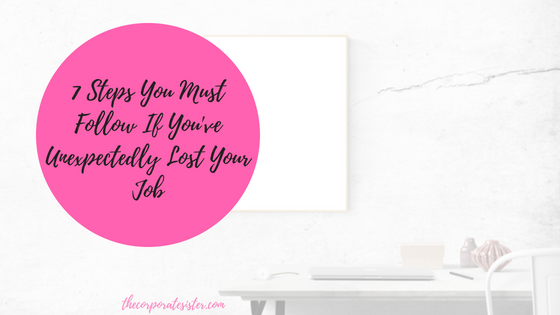 If you’ve ever unexpectedly lost your job, you know it’s certainly not a good feeling. If you haven’t, it’s probably one of the most painful experiences you’ll ever go through. It’s especially true when it’s unexpected and through no fault of your own. Although for some, it can be one of the best things to happen to their careers, the initial hurt is hard to avoid.
If you’ve ever unexpectedly lost your job, you know it’s certainly not a good feeling. If you haven’t, it’s probably one of the most painful experiences you’ll ever go through. It’s especially true when it’s unexpected and through no fault of your own. Although for some, it can be one of the best things to happen to their careers, the initial hurt is hard to avoid.
According to career placement firm Challenger, Gray and Christmas, job cuts soared 218%in the month of January 2016 . No wonder the fear of losing their jobs is haunting so many professionals at work. After all, it means not only losing your paycheck, but also foregoing your daily routine, your health benefits, work perks, and the friendships you may share with co-workers. Despite the traumatic consequences of losing one’s job, there are a few things you can do to lessen the negative impact.

Here are 7 steps to follow when you unexpectedly lose your job:
-
Give yourself some time and space
Losing a job is a painful experience. It requires time and space to get over it and start fresh. The point here is not to transfer the potential resentment, discouragement and bitterness you may have felt into your next experience. Take some time to reflect over what has happened, and make a commitment to let go of the negative part before embarking on your next professional adventure.
-
File for unemployment
If you have been let go from your previous position through no fault of your own, you may be eligible for unemployment. However, even if you have been fired, there are instances in which you can claim unemployment benefits. Carefully research your options and start filing as soon as possible.
-
Explore health insurance and retirement plan options
Make sure to check with Human Resources or with your manager for options to continue your health coverage. Otherwise, research new options to cover you while you’re out of work. You may also want to check on available options to maintain your existing pension plan or 401k.
-
Mind your budget
Even when you get unemployment benefits, these will most likely amount to less than the paycheck you used to get. Start thinking about ways to save money or build alternative sources of income while you look for another job. Keep in mind that many states have shortened the length of unemployment benefits, so plan for it as well in your budget!
-
Clean up and Revamp your Resume, Linked In Profile and Social Media accounts
Don’t wait to update your resume and Linked In profile before applying for available positions. As you apply for jobs, highlight your most relevant qualifications and skills. Don’t forget to also revisit your Linked In Profile, and ensure it matches your resume. If possible, seek out additional recommendations to add, and infuse a touch of originality with your particular skills and abilities!
Employers do research potential employees online, including their social media accounts. You may want to remove any questionable content or pictures on there, or adjust your privacy settings at the very least.
-
Reconnect with your network
It’s easy to forget all about networking while you’re employed. However, losing your job unexpectedly makes you realize how much you need to re-connect with it. Go ahead and contact past colleagues and managers, sign up for networking events and ask your contacts to let you know of any job openings in the future.
-
Get Your Job Search Underway
Only focus on job listings that match your interests and skills. Save your precious time and avoid positions that aren’t a good fit. Prepare to write targeted cover letters in which you present a compelling case for yourself. Don’t forget to practice your negotiation and interview skills as well!
What would you add to this list?
To Your Success,
The Corporate Sister.






